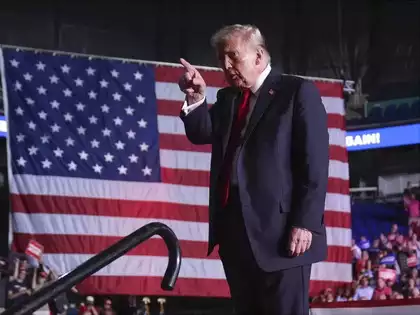Iran and its allies are closely watching the U.S. presidential election, fearing a Donald Trump’s return as President.
Trump’s Impact on Iran: Rising Tensions and Renewed Sanctions
During his previous term, Trump imposed severe sanctions on Iran, which strained its economy and forced significant cutbacks. He withdrew the U.S. from the 2015 nuclear deal, citing it as inadequate and ineffective. The deal, which aimed to limit Iran’s nuclear program in exchange for reduced sanctions, was seen by Trump as a flawed solution that did not provide enough security for Israel or U.S. interests. With Trump’s possible return, Iran worries he will reinstate his “maximum pressure” policy, which could include intensifying sanctions and giving Israel support for military actions targeting Iranian nuclear sites.
Israel’s Destructive Strikes Disrupt Iran’s Missile Exports to Russia
These fears are not just limited to Iran’s leadership but extend to its allies in Lebanon, Iraq, and Yemen, where Iran has built influence. Regional actors believe Trump’s support of Israeli Prime Minister Benjamin Netanyahu could embolden Israel to carry out more frequent and devastating strikes on Iranian facilities. Trump has previously signaled support for Israel taking decisive action against Iran’s nuclear program. Iran’s leaders understand that should Trump resume his former policies, the already strained Iranian economy might be pushed to the brink, forcing them to negotiate a new nuclear deal under much harsher terms.
Israeli Military Actions: Growing Threats to Iran’s Nuclear Program
Israeli leaders, notably Prime Minister Netanyahu, have consistently viewed Iran’s nuclear program as a significant threat. Over recent years, Israel has executed various military actions against Iranian-linked targets in Syria, Iraq, and Lebanon. These attacks often focus on disrupting the activities of Iran-backed groups, such as Hezbollah in Lebanon and Hamas in Gaza, which Israel claims are used by Iran to extend its influence in the region. Israeli strikes have specifically targeted missile production facilities and arms storage sites linked to these groups, aiming to weaken Iran’s regional proxies.
Netanyahu has expressed support for striking Iran’s nuclear infrastructure directly if it poses an imminent threat. If Trump returns to the White House, it is expected that Israel will find greater U.S. endorsement for such strikes. Trump’s administration previously took a hard line, even ordering the assassination of Qassem Soleimani, a top Iranian military leader and central figure in Iran’s overseas operations. This action marked a significant escalation in U.S.-Iran tensions, and Iran responded with missile attacks on American bases in Iraq, though the confrontation eventually de-escalated. A Trump comeback could mean a continuation, or even intensification, of this confrontational stance, giving Israel the leeway to carry out targeted attacks that could severely impact Iran’s nuclear ambitions.
Economic Struggles and Oil Sanctions: Iran’s Ongoing Battle
Under Trump’s administration, sanctions targeted Iran’s oil exports, a major source of revenue for the country. These sanctions led to severe economic downturns, contributing to inflation, unemployment, and general discontent among Iran’s population. Iran’s leadership has historically tried to circumvent sanctions by developing trade relations with countries that were more lenient toward Iran, but the pressure from U.S. sanctions was nonetheless significant.
Geopolitical Turmoil: China’s Sanctions Disrupt U.S. Drones, India’s Defense Strategy in Jeopardy
Trump’s “maximum pressure” approach aimed to reduce Iran’s oil exports to nearly zero, limiting its access to foreign currencies and affecting its ability to maintain essential services and fund military activities abroad. The sanctions hit Iran’s banking sector hard, restricting access to international markets and making it challenging for the country to engage in global trade. This economic strain forced Iran to make difficult decisions, limiting its influence and curbing its support for allied groups. If Trump returns, Iranian officials believe that he will again target Iran’s oil industry, aiming to further isolate the country economically and increase pressure on its leadership.
In response to the possibility of Trump’s reelection, Iran has indicated that it is preparing for the worst. Iranian officials insist that the nation will continue to find ways to sell oil and evade sanctions if necessary, but they also recognize that Trump’s approach could lead to even stricter measures. Some analysts believe that a Trump presidency could pressure Iran into agreeing to a new nuclear deal with stricter terms, as the economic impact of renewed sanctions might leave Iran with few options. The extent of Trump’s potential policies and Israel’s willingness to take military action remain uncertain, but for now, Iran is bracing for what could be a turbulent period if Trump reenters the White House.


